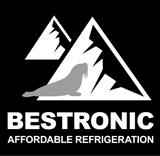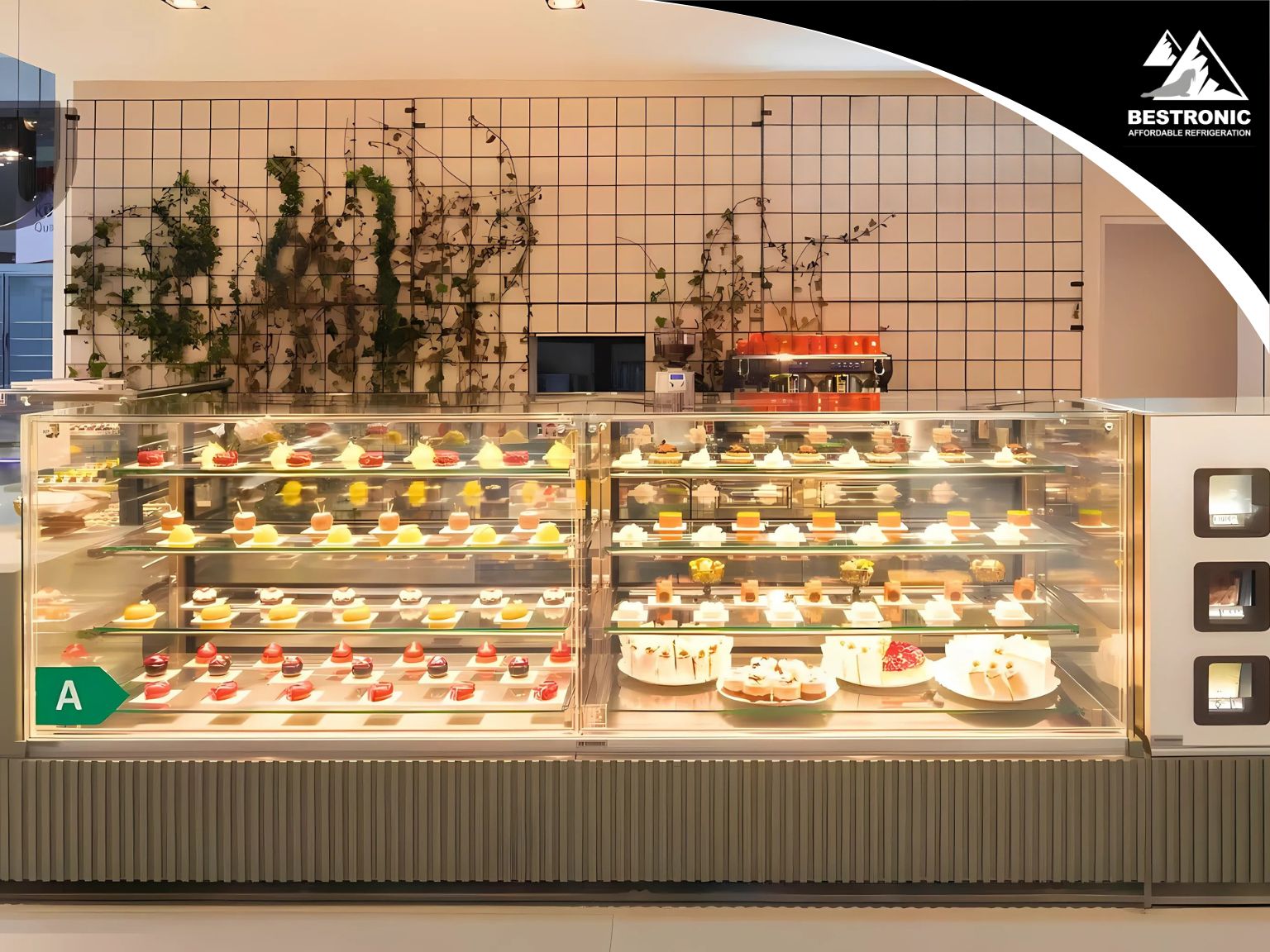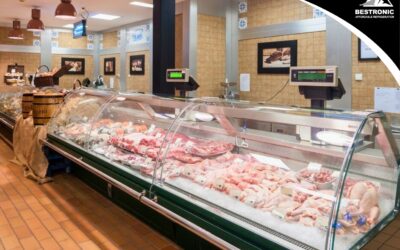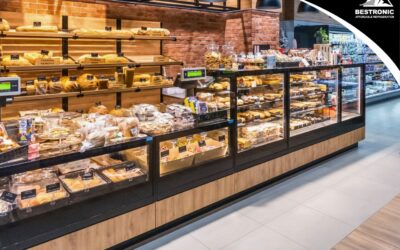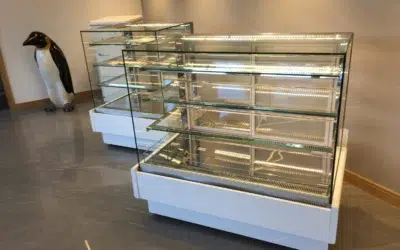Energy efficiency is essential for UK retailers that rely on commercial refrigeration. With refrigeration making up as much as 50% of total energy consumption in supermarkets, grocery stores, and convenience shops, improving efficiency can lead to significant cost savings while ensuring compliance with UK energy regulations.
As energy prices continue to rise, businesses need to focus on reducing electricity costs, improving sustainability, and extending the lifespan of their equipment.
Whether you’re opening a new store or upgrading your existing refrigeration units, making energy-efficient choices can have a huge impact on operating costs and long-term profitability.
This article, ‘Energy Efficiency in Commercial Refrigeration’, explores the importance of energy efficiency in commercial refrigeration, explains how refrigeration affects energy costs in retail, and outlines key UK regulations that businesses need to follow.
It will also cover how to choose the most efficient refrigeration equipment, from low-energy display fridges to closed-door units with high-efficiency compressors, and highlight essential maintenance and operational practices to help businesses reduce energy waste and keep their refrigeration systems running efficiently for years to come.
Content Page
- Importance of Energy Efficiency in Commercial Refrigeration
- Why Energy Efficiency in Refrigeration Matters
- UK Regulations and Energy Standards for Commercial Refrigeration
- Choosing Energy-Efficient Commercial Refrigeration Equipment
- Which Refrigeration Equipment is Best for Your Business?
- Regular Maintenance and Operational Practices for Energy Efficiency in Commercial Refrigeration
Importance of Energy Efficiency in Commercial Refrigeration
For UK retailers, refrigeration is one of the biggest energy costs. Since commercial fridges and freezers run 24/7, they consume a lot of electricity, which directly impacts your operating expenses and carbon footprint.
With rising energy prices, even small improvements in efficiency can lead to big savings over time.
Investing in energy-efficient refrigeration doesn’t just cut costs—it also helps businesses stay compliant with UK energy regulations and meet growing customer demand for sustainable, eco-friendly practices.
By choosing the right equipment and following best practices, retailers can reduce energy waste, lower their bills, and extend the lifespan of their refrigeration systems.
Why Energy Efficiency in Refrigeration Matters
In recent years, UK businesses have seen a sharp rise in energy costs. For retailers, especially those with already tight profit margins, these rising costs can cause significant financial pressure. Since refrigeration makes up a large part of these costs, improving its efficiency can greatly benefit your business.
The UK government’s Department for Business, Energy & Industrial Strategy (BEIS) emphasises that businesses investing in energy-efficient equipment are better prepared to handle unpredictable energy prices.
By choosing energy-efficient refrigeration solutions, your business can:
- Save money by reducing monthly energy bills.
- Protect your business from sudden rises in energy prices.
- Become more sustainable, helping you meet the UK’s environmental targets and attract eco-conscious customers.
Investing in energy-efficient refrigeration isn’t just good for the environment—it’s a smart, practical decision for your business’s long-term financial stability.
UK Regulations and Energy Standards for Commercial Refrigeration
In the UK, commercial refrigeration equipment is regulated to ensure it meets strict energy efficiency standards.
These regulations help businesses reduce energy consumption, lower environmental impact, and decrease greenhouse gas emissions.
Understanding these standards is essential for any retailer aiming to reduce operational costs and comply with UK environmental targets.
Key UK Regulations and Standards include:
- Ecodesign Regulations:
These UK regulations set minimum energy performance standards for commercial refrigeration equipment, ensuring products use less energy and produce fewer emissions. - Energy Labelling Requirements (A-G Ratings):
Commercial refrigeration units must display clear energy labels. These labels help businesses quickly identify and select the most energy-efficient equipment, reducing long-term operational costs.
Following these regulations not only ensures compliance but also helps your business achieve significant cost savings while demonstrating your commitment to sustainability.
Choosing Energy-Efficient Commercial Refrigeration Equipment
Investing in the right refrigeration equipment isn’t just about keeping products cold—it’s about cutting costs, improving efficiency, and making sure your business runs smoothly. With energy prices rising and efficiency standards tightening, choosing energy-efficient refrigeration is a smart move for any UK retailer.
Understanding Energy Labels
Every commercial fridge and freezer sold in the UK has an energy efficiency label, ranking units from A (most efficient) to G (least efficient). These labels give you a quick overview of energy consumption (kWh/year) and the unit’s recommended storage capacity, helping you make an informed choice. The more efficient the unit, the lower your energy bills.
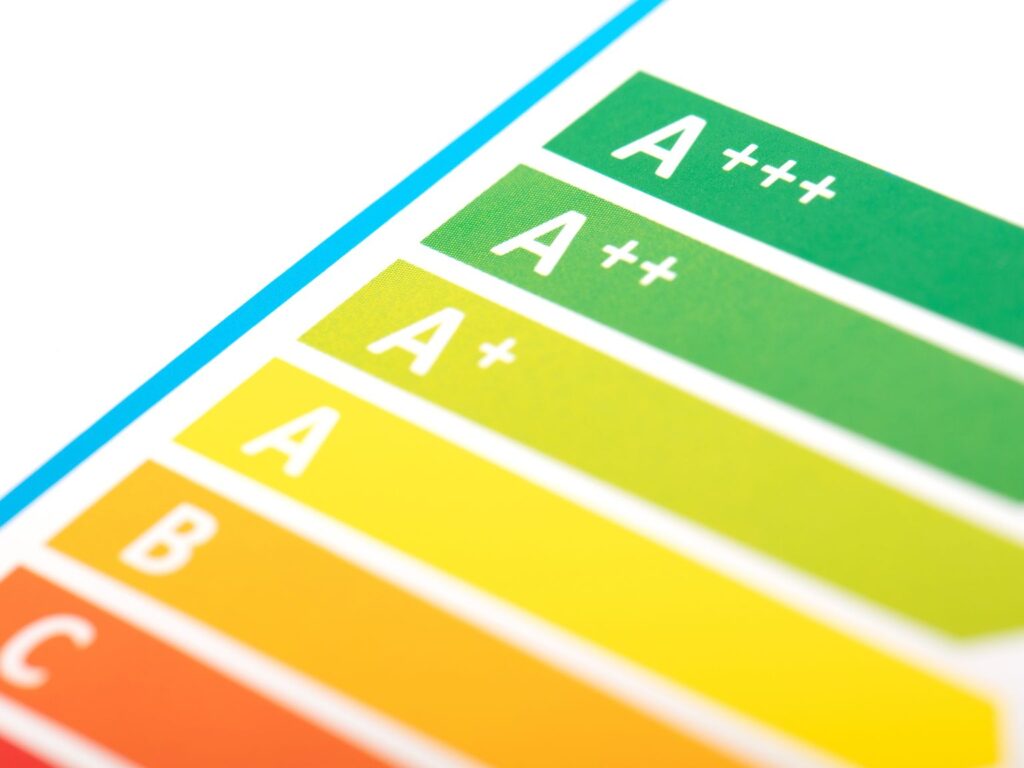
Which Refrigeration Equipment is Best for Your Business?
Low-Energy Display Fridges & Freezers
If you run a supermarket, convenience store, or café, display fridges and freezers are a must. But traditional models can drive up energy costs fast.
What to look for:
- LED lighting – Uses less energy and produces less heat.
- Double or triple-glazed glass doors – Keeps cold air in and reduces energy waste.
- Intelligent defrosting systems – Automatically defrosts only when needed, preventing unnecessary energy use.
Closed-Door Refrigeration Units
Open-display fridges may be convenient, but they constantly lose cold air, forcing the system to work harder. Closed-door units solve this problem, saving you money and energy.
Why choose them?
- Lower energy bills – Less cold air escapes, meaning the unit doesn’t have to work as hard.
- Better product freshness – Keeps food and drinks at a stable temperature.
- Improved food safety – Consistent cooling reduces the risk of spoilage and contamination.
Refrigeration Systems with High-Efficiency Compressors
Compressors are the heart of any refrigeration system—and they use the most energy. Choosing a model with a high-efficiency compressor can make a massive difference in long-term costs.
The benefits:
- Lower running costs – Uses energy more efficiently, saving money.
- More reliable cooling – Keeps temperatures consistent, even during busy periods.
- Longer lifespan – Less strain on the system means fewer repairs and a longer-lasting unit.
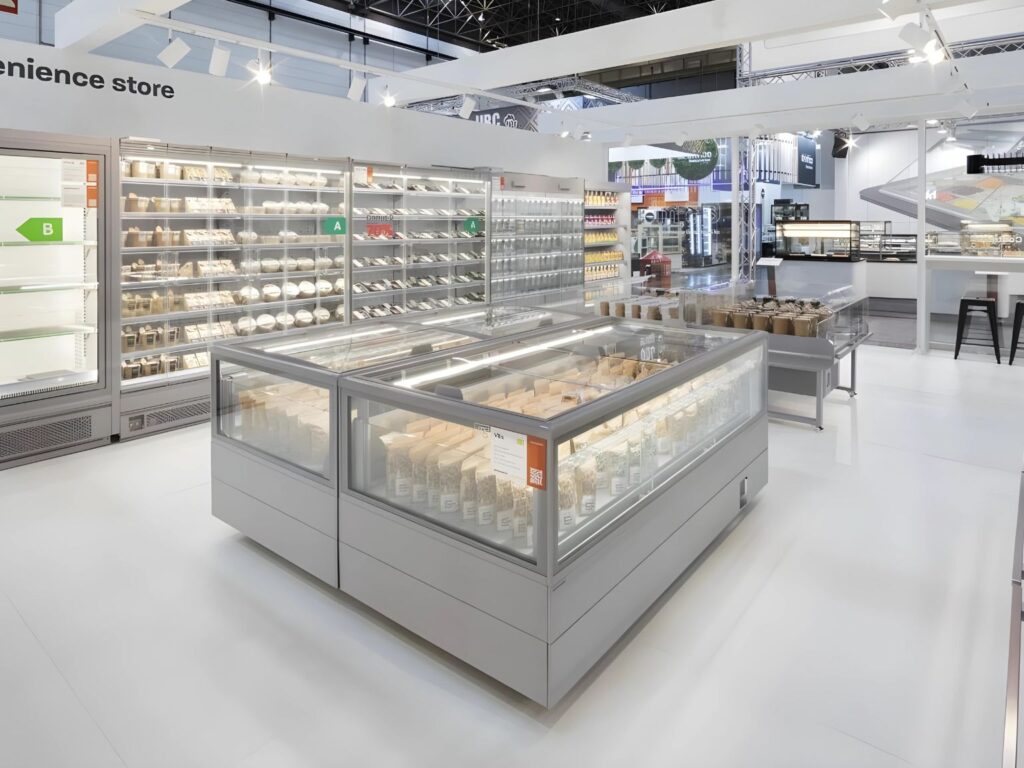
Regular Maintenance and Operational Practices for Energy Efficiency in Commercial Refrigeration
Regular maintenance is essential to keep your refrigeration equipment running efficiently, saving your business money and extending the lifespan of your refrigeration systems. Here’s how you can achieve optimal efficiency through straightforward yet impactful practices:
- Condenser Coil Cleaning: Dirty condenser coils decrease efficiency by up to 30%, as the refrigeration system struggles to dissipate heat effectively. Clean condenser coils at least twice per year to ensure efficient operation and lower energy consumption.
- Door Seals and Gasket Checks: Faulty or damaged door seals allow cold air to escape, forcing refrigeration units to consume more energy. Regularly inspect seals and replace them promptly if damaged. This simple step can significantly reduce energy waste and improve cooling consistency.
- Temperature Control: Avoid excessively low temperatures; set commercial fridges between 3°C to 5°C and freezers at -18°C. Accurate temperature settings help prevent unnecessary energy usage, ensuring both product quality and cost efficiency.
- Proper Loading of Refrigeration Units: Overloading reduces airflow, forcing units to work harder. Allow adequate space between products to maintain proper airflow and consistent temperature control.
- Effective Defrosting: Excessive frost build-up insulates cooling coils, causing higher energy use.Regularly monitor units for frost buildup and use intelligent defrost systems or manual defrosting when necessary.
- Staff Training and Awareness: Educating your employees can significantly boost refrigeration efficiency—train staff to promptly close refrigeration doors, quickly report any issues, and understand basic temperature settings and maintenance checks.
Why Energy Efficiency in Refrigeration is a Smart Business Move
Running a retail business comes with enough costs—so why let refrigeration add more than it needs to? Choosing energy-efficient equipment, keeping up with regular maintenance, and training your team on best practices can significantly lower your energy bills and extend the life of your refrigeration units.
With rising energy prices, optimising your refrigeration system isn’t just a smart move—it’s a necessity. Simple changes, like switching to LED lighting, ensuring door seals are intact, and choosing well-insulated fridges, can make a huge difference to your bottom line. Plus, staying energy efficient means complying with UK regulations and reducing your business’s environmental impact.
Investing in better refrigeration today will save you money, improve efficiency, and future-proof your business.
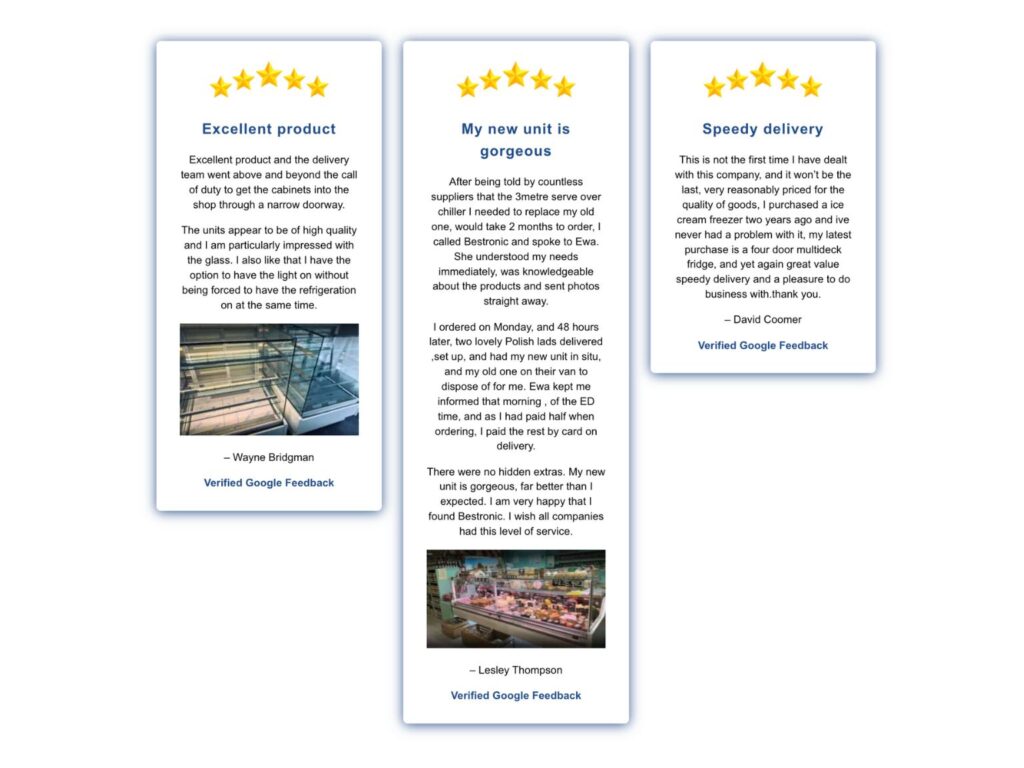
Need help finding the right energy-efficient solution? Get in touch with our team—we’re here to help.
At Bestronic Refrigeration, we specialise in high-quality commercial refrigeration units from Europe’s leading manufacturers.
Contact us today to discuss your refrigeration needs and discover how our cost-saving solutions can benefit your business.
